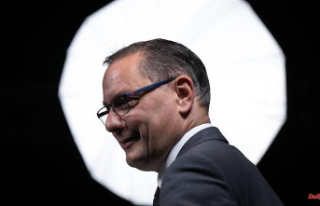This Wednesday is a highly symbolic day: it marks half a year since the start of the Russian war of aggression. At the same time, Ukraine is celebrating its Independence Day. Despite the rocket terror, there can be no talk of war-weariness.
When independent Ukraine turned 30 last year, it celebrated the proud anniversary with a huge concert, among other things. August 24, 2022, the day that also marks six months of the Russian invasion, will look completely different - without any public celebrations. The risk of massive rocket fire from the Russians on this symbolic date is too great. President Volodymyr Zelenskyy has already called on people not to ignore air alerts.
It's clearly not the best of circumstances for one of the most important holidays of the year in this country. The suffering that Ukrainians have endured in the last six months is enormous. But Ukraine has never experienced a more important independence day. For centuries, Ukrainians fought for their identity, against the oppression of their own culture and language, and for their statehood. Even if the collapse of the Soviet Union seems logical from today's perspective, it was quite sudden in 1991. Back then, the Ukrainians got what they wanted without really expecting it at the time - and had to come to terms with it first.
When Putin prepared his own people for war with his long speech on February 21, 2022, he completely denied Ukraine's right to exist at all levels. Nevertheless, six months after the start of the "special operation" Ukraine's statehood is not in question, despite some actual losses of territory. On the contrary, more than 90 percent of Ukrainians still believe in victory - and clichés about the divided Ukrainian society are finally outdated.
Actually, that already happened in the spring of 2014 with the Russian annexation of Crimea and the beginning of the war in Donbass, when the new Ukrainian independence struggle really began - against an aggressive neighbor who is disturbed by the mere existence of a Ukrainian identity and who is also a nuclear power is. In the predominantly Russian-speaking south-east, there were definitely people who were dissatisfied with the government's policies in Kyiv. However, only a marginal minority remained pro-Russian. Now any pro-Russian attitude in politics has been completely eliminated for at least many decades. Many Ukrainians who used to speak Russian in everyday life are switching to Ukrainian.
Nobody knows how long this war will last and what additional sacrifices Ukraine will have to make for its independence. Also, Ukrainian society will probably never be heterogeneous; The country is too big and politically too colorful for that, as the Orange and the Maidan revolutions have already shown. But never in these 31 years have Ukrainians as a whole valued their independence as much as they do today. And never before have they understood the classic Ukrainian literature so well, which many made fun of at school because it is mostly about oppression and suffering.
All this means that there is practically no talk of war fatigue in Ukraine. Of course people are tired after these terrible six months, of course they long for a life in peace. But it's a war that Ukraine doesn't want, on which the country's existence depends - and they're simply not ready for a bad peace based on a de facto surrender agreement, like the Minsk agreements were. Postponing the conflict again with the certainty that Russia would attack again in a few years would not do the Ukrainians any good. Peace can only be made from a position of strength - this consensus of Ukrainians outweighs any fatigue.
Despite this reality and despite constant air raid alerts, people are increasingly trying to go about their everyday lives as normally as possible. This is also the wish of the Ukrainian government, which, among other things, supported the staging of the new season of the Ukrainian football league on home soil despite the war. For a while, the Kyiv city administration's claim that there would be three million people in the capital again didn't seem credible. But at the moment it does indeed look like it. The inner city is filling up, the cafés are getting fuller, although most Ukrainians have lost income. There are also significantly more cars on the road again, because there was no longer any sign of the former shortage of petrol.
Unlike at the beginning of the summer, Kyiv is alive again. This too is a sign of strength that Ukraine is showing in the face of this bloody Russian attack. The Ukrainians can only really celebrate after beating Russia. But on this independence day, despite all the misery, there are enough reasons to be proud of oneself and one's own country, even if the Ukrainian struggle for independence is still not over.












